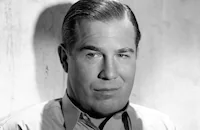Here Comes the Band
Brief Synopsis
Cast & Crew
Paul Sloane
Ted Lewis
Virginia Bruce
Harry Stockwell
Ted Healy
Nat Pendleton
Film Details
Technical Specs

Synopsis
In 1919, as American soldiers from the 401st Infantry return home from the war, former army band members Happy and his friend, "Piccolo Pete," arrive in New York and find work at Scurry's Cab Company. Happy is soon put in charge of keeping Pete's erratic work habits, which include his tendency to attract the company of musicians, in check. Pete, however, quickly befriends Ollie Watts, a talented singer and songwriter whom he encourages to enter in an upcoming amateur talent contest sponsored by a local radio station. At the event, while waiting for his turn on stage, Ollie joins the audience, where he is forced to endure the performances of a professional sneezer, a taxidermist who imitates whipporwils, a woman who makes chicken sounds and a yodeler. One contestant, a pretty stenographer named Margaret Jones, makes a valiant attempt to sing, but is heckled by the audience. After comforting the dejected contestant, Ollie asks for her phone number so that he can call her for a date. When Ollie finally takes the microphone, he introduces his songs with an explanation of their origins. Inspired by his childhood memories of traveling through America with his father in search of oil, Ollie's songs become instant hits with radio audiences and soon propel him into stardom. Impressed with the performance, music publisher Simmons invites Ollie to a private audition, where he sings his new song, "Headin' Home." Meanwhile, when Margaret returns home, she finds attorney and relentless suitor Don Trevor waiting for her. Despite Simmons' initial show of interest in Ollie, the publisher informs Ollie after the audition that he will not be signed with the company. Ollie later attends a party, where he meets music expert DeValerie, who accuses him of plagiarism after playing a song on his phonograph that bears a close resemblance to his own. Ollie soon discovers that his song, "Headin' Home," was illegally published by the unscrupulous Simmons, and that unknown to him, the purloined tune has become a top seller around the country. Certain of Ollie's innocence, Margaret comes to his aid by enlisting the help of Don, who files a $50,000 lawsuit against Simmons. The charges result in a trial, where in order to prove he authored the song in question, Ollie arranges to bring to the courtroom every person across the nation who inspired him. With the help of former army musicians who are recruited by Happy and Pete, Ollie and his witnesses, consisting of Americans from all walks of life, perform his song with such feeling that the judge, realizing the song is Ollie's, rules in his favor.

Director
Paul Sloane
Cast
Ted Lewis

Virginia Bruce
Harry Stockwell

Ted Healy

Nat Pendleton

Addison Richards

Donald Cook
Spanky Mcfarland

Robert Mcwade

Henry Kolker
Robert Gleckler
Richard Tucker
Bert Roach
Tyler Brooke
Ferdinand Gottschalk
May Beatty

Charles Lane
Otto Fries

Billy Gilbert
Monty Vandegrift
Fredric Santly
Sherry Hall
Nat Carr
Frank Marlowe
Gene Morgan
Harry "zoop" Welsh
Pat West
Fred Sanborn
Lew Harvey
Jack Cheatham
William Quinn
Earl Eby
Perry Ivins
Ernie Alexander
Wally Maher
Ernie Adams
Al Williams
Jerry Sloane
Jack Mulhall
Don Brody
Phil Tead
Edward Earle
Ed Dearing
Edward Cooper
Douglas Williams
Minerva Urecal
Rolfe Sedan
Esther Michelson
Jack Raymond
Florence Gill
Henry Sylvester
David Horsley
Frank Darien
James Donlan
Tiny Sandford
Elizabeth Pendleton

Gertrude Astor
Marjorie Beebe
Maidel Turner
Crew
Harold Adamson
Walter Donaldson
Ted Fiorito
Cedric Gibbons
Chester Hale
William A. Horning
Lucien Hubbard
Frank E. Hull
Paul Lamkoff
Burton Lane
Harry Macpherson
Victor Mansfield
Charles Schoenbaum
Harry Sharrock
Douglas Shearer
Paul Sloane
Ralph Spence
Herbert Stothart
Dolly Tree
Albert Von Tilzer
Edward Ward
Ned Washington
Edwin B. Willis

Film Details
Technical Specs

Quotes
Trivia
Notes
A working title for this film was Rise and Shine. Although Hollywood Reporter production charts and pre-release news item list Betty Furness, Fuzzy Knight, Charles Waldron, Broderick O'Farrell and Billy Dooley in the cast, their appearance in the released film has not been confirmed. A Hollywood Reporter post-production news item notes that Hyman Pearson completed a "writing assignment" on this picture, but the exact nature of Pearson's contribution to the final film is not known. According to a Variety pre-release news item, following a July 26, 1935 preview screening of Here Comes the Band, M-G-M cut over 1,800 feet from the film. Most of the cuts were made in opening scenes, the war montage and the courtroom scene. The film had a second preview on August 6, 1935 at the Ritz theater, after which another twelve minutes of film were cut.
According to censorship material in the MPAA/PCA Collection at the AMPAS Library, the PCA, in keeping with its refusal to permit the portrayal of criminals who have an upper hand against the law, and in accordance with its restrictions on the use of machine guns in films, warned M-G-M that "a machine gun must not be shown in possession of the policeman's prisoner." In addition, the PCA stated its objection to the use of the word "Hell-Bent" in the title and lyrics of the song "Hell-Bent For Heaven," and suggested, as an alternative, either "On the Way to Heaven" or "Away to Heaven." M-G-M eventually changed the title and lyrics of the song to "I'm Bound For Heaven."













